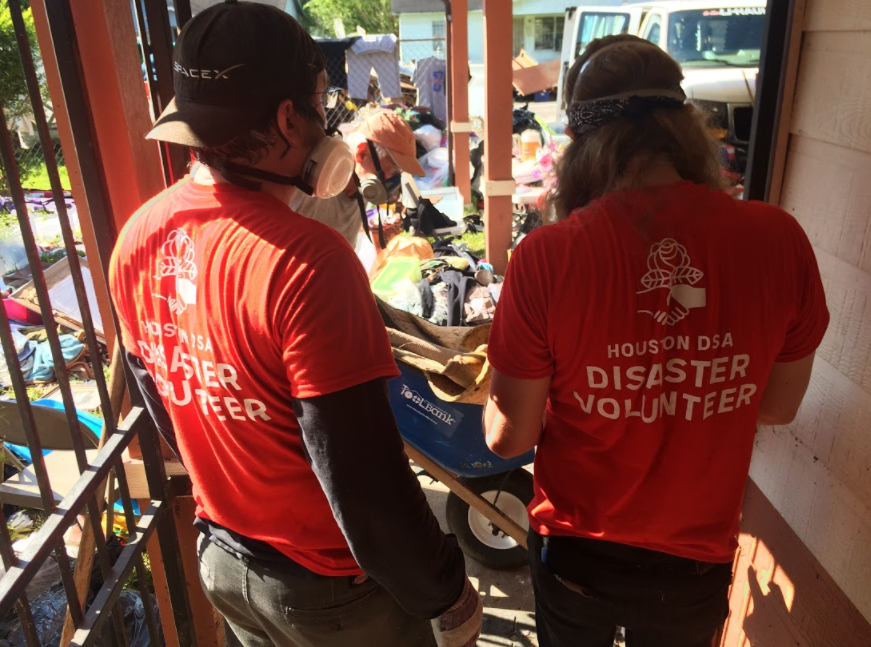The Southern Movement Assembly is on its seventh year of bringing together movement organizers from across the U.S. South to strengthen relationships, build a deeper political analysis, and connect different struggles. It’s something different from a conference, its participants say–its goal is to build a different kind of movement that challenges the structures of capital and white supremacy. Libby Devlin of National Nurses Organizing Committee/National Nurses United, Saladin Muhammad, retired international rep for the United Electrical Workers union, founding member of the Black Workers for Justice, and Rita Valenti of National Nurses Organizing Committee, Healthcare-NOW! all worked to pull together the Movement Assembly and in particular the Workers Justice Assembly part of the gathering, and they joined me to talk about the movement they are building and what the rest of the country can learn from a place that has been Trumplandia for a long time.
RV: I really want to underscore this notion of not just mobilizing, not going backwards in history to a time that is past, and not just a series of workshops, but actually deep political organizing that produces a change of consciousness and begins to actually discuss the vision of the world that we want to build in this hugely transitional and chaotic period. And development of strategies.
I think the South has had much more of a handle on that because we have had a lot less, since our inception, resources that we have had to rely on each other and respect each other and understand the centrality of our history based in genocide and slavery. Wall Street has controlled the South and through that control has really controlled the nation. We see that in not just this Trump era, but more so in the history of Right to Work in terms of labor, the history of “state’s rights,” particularly in terms of healthcare and failures to expand Medicaid. What we bring, I think, to this table is that we try to listen to each other and not just tell each other.
LD: I guess I always kind of hoped that the standards in the northern states would move South, not vice versa. So, when you look at income inequality, it is worse in the South. Health outcomes are worse in the South. Education quality is worse in the South. Infant mortality rates are worse in the South. The percent of unionization rates is directly linked to all of that, as well. Particularly, income inequality and wealth inequality, there’s a reverse correlation between union strength and income inequality. The stronger the union is, the less income inequality is.
I think what we bring from the South is that we have been living under these same conditions that the existing government and their funders would like to see brought throughout the country. We have existed. We have survived. We can say we have done that. I think a lot of people in places like Michigan, Wisconsin, Illinois, Indiana, Missouri, they are all going to be faced with the same conditions that we have now. I know that they are working to try to figure out “How do you fight back in that environment?” because the political climate has been different there. One thing that people can learn from us is how to be scrappier. How do you fight in that context? There has been a lot of cross-state discussion that has been going on and I think that is helpful and useful.
SM: Historically, the labor movement, in particular, has not recognized the strategic role of the South in a national strategy. The south is a zone of global capital very much like, and that pre-existed, NAFTA, the maquiladoras, etc. The South hasn’t been looked at almost as if it had maquiladoras, but international capital is now seeing it as a region of concentration that is protected by a state that is dominant internationally. Economists have said that the regional economy of the South would be considered as the world’s fourth largest economy, following Japan. If we are not recognizing this concentration of global capital in the South and understanding how to challenge the outrageous actions of US and global capital then I don’t think we are looking at a strategy correctly.
Up at Truthout.
Up at The Progressive.
Up at In These Times.
Interviews for Resistance is a syndicated series of interviews with organizers, agitators and troublemakers, available twice weekly as text and podcast. You can now subscribe on iTunes! Previous interviews here.


